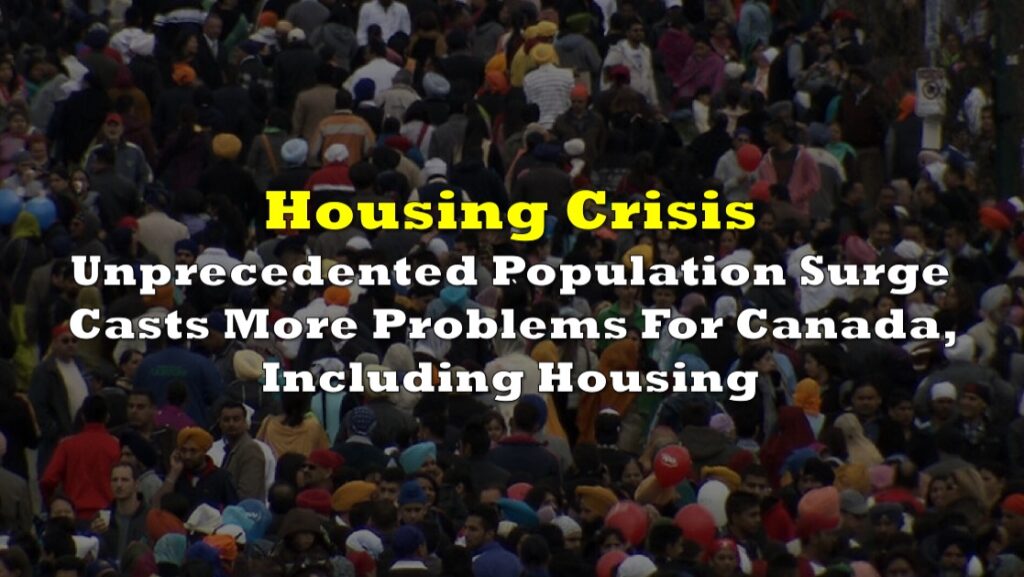While more and more Canadians are struggling to put themselves in a home they own, yielding more renters that have to keep up with the rising rent payments, Minister of Housing Ahmed Hussen seems to be avoiding characterizing the situation as a crisis.
Pressed for a response by Parry Sound—Muskoka MP Scott Aitchison on whether Canada is currently facing a housing crisis, Hussen otherwise described it as a challenge.
“I think we, as a country, are experiencing challenges with respect everyone having access to a safe and affordable home,” Hussen said.
Asked for a second time, Hussen reiterated that he would call it as “a challenge faced by many Canadians” and that “we have to work together to make sure we address those challenges.”
Aitchison asked him for the third time if he wouldn’t call it a crisis. Hussen replied: “I think I’ve answered the question.”
Tent cities are growing.
— Scott Aitchison (@ScottAAitchison) February 15, 2023
Young people have given up on home ownership.
Rent payments have doubled.
Mortgage payments have doubled.
I asked the Minister of Housing if he agrees that we are in a housing crisis.
You won't believe his response. #cdnpoli pic.twitter.com/iPkWYq4yvL
Later on, the MP would define crisis as “a time of intense difficulty, trouble, or danger.”
“I guarantee you: people that are trapped in tent cities… would call it a crisis. The number of young people who’d given up of ever owning a home? They would call it a crisis. The number of people who simply cannot find a place to rent would call it a crisis,” Aitchison retorted.
Hussen and renting
As renters grow in the country and homebuyers fall, observers are pointing out that Hussen–himself a rental property owner– might be serving a conflict of interest as he heads the housing ministry that aims to provide “safe and affordable” and own-able homes for Canadians.
Request to #followthemoney on housing minister buying rental property & saying he wants to protect mom & pop investors such as himself. WTF ! @StephenPunwasi @JohnPasalis @SteveSaretsky @MoreNeighbours @nasmadotali @AbeEvreniadis @jessysbains @daniel_foch @d_demelis @REWoman pic.twitter.com/k6QScYqVrT
— Barshan Quadry (@bquadry) February 16, 2022
And Hussen is not alone: according to their filings with the federal conflict of interest commissioner, over one-third of the Liberal cabinet ministers possess rental or investment real estate assets.
While perfectly legal, real estate experts say the holdings show how Canadians increasingly see real estate as a financial asset rather than a place to live.

Hussen recently announced $18.5 million in federal funding for the Rapid Housing initiative in Ottawa. The money, according to the housing minister, would be used to build at least 25 “rapidly built and deeply affordable” homes for persons transitioning out of homelessness and reintegrating into the community, including families.
“We will ensure that folks who need housing the most — the most vulnerable members of our community — can get the housing they need so that they can build the lives they deserve,” Hussen said in Monday’s virtual news conference.
“We will ensure that folks who need housing the most — the most vulnerable members of our community — can get the housing they need so that they can build the lives they deserve.”
— Ahmed Hussen (@HonAhmedHussen) February 14, 2023
⬇️https://t.co/ZXdwfq7HTJ
The state of Canadian housing
According to a report by RBC economists Robert Hogue and Rachel Battaglia, there were nearly 5 million households renting their dwelling in 2021, compared to only 4.1 million only ten years earlier. Although Census data shows that two-thirds of Canadians were homeowners last year, the number of renters has risen three-fold compared to the rate of homebuyers in the past decade.
Latest Statistics Canada data shows that the price of a new home across 19 of the 27 census metropolitan areas remained unchanged between November and December, following three consecutive months of declines.
Nationally, the price of a new home rose 7.7% from December 2021, marking a deceleration from the 10.3% annual increase noted the year before. New home prices accelerated rapidly in the beginning of 2022, rising 2.5% in the first quarter thanks to ultra-low interest rates. Prices continued increasing into the second quarter as homebuilding costs rose, before eventually subsiding in response to rising interest rates.
READ: Canadian Home Prices Cool as Interest Rates Scare Buyers
Carolyn Rogers, senior deputy governor of the Bank of Canada, warned that rising interest rates may pose a “painful” squeeze for many recent house buyers. With successive hikes in interest rates and declining home prices, homeowners with variable-rate mortgages are undergoing a difficult transition.
“The bottom line is that mortgage costs for some Canadians have already increased, and they will likely increase for others in time, making home ownership more expensive.” Rogers said.
READ: BoC: Homebuyers On Variable-Rate Mortgage To Face “Painful” Squeeze As Rate Hikes Continue
Canada’s housing market seems to not be for ordinary Canadians looking for their first home anymore: instead, it’s becoming a commodity where speculators search for their next investment. A recent analysis by Statistics Canada’s Canadian Housing Statistics Program (CHSP) found that at the beginning of 2020, more than one out of five homeowners bought the respective property for investment purposes.
In Ontario, a staggering 41.9% of condos were designated as investment properties, while in British Columbia, that share amounted to 36.2%. In fact, a significant amount of investment properties in Ontario were purchased by businesses— a total of 74,485 units, or 13.4% of dwellings in this category— to be exact, marking the highest proportion among all provinces analyzed.
However, these early investors in the homebuilding market during the industry’s hot streak are seeing their investment evaporate as interest rates increase and home prices fall.
Buyers of pre-construction houses from Mattamy Homes protested recently, saying the firm should act on the falling value of home prices causing them to lose their investment on houses they bought at market’s peak.
READ: Mattamy Homes Buyers Protest For Losing Their “Investment”
In one of the ways to address home availability and affordability for Canadians, the Canada Mortgage and Housing Corporation issued regulations earlier this year regarding the restriction on foreign homebuyers as the new real estate law is expected to take effect for two years starting 2023.
In summary, non-Canadians and corporations owned by non-Canadians are prohibited from purchasing residential property in Canada for two years under the Prohibition on the Purchase of Residential Property by Non-Canadians Act. Residential properties are defined to be “buildings with 3 homes or less, as well as parts of buildings like a semi-detached house or a condominium unit.” The law also applies to vacant lands that are zoned for residential use or mixed-use and are located within a census metropolitan area.
Information for this briefing was found via CTV News, CBC, and the sources mentioned. The author has no securities or affiliations related to this organization. Not a recommendation to buy or sell. Always do additional research and consult a professional before purchasing a security. The author holds no licenses.









